
What is Data Science?
What is Data Science?
The requirement of storage has grown to a high level just because the world has entered the period of Big Data. The future of Artificial Intelligence in Data Science and hence it is very significant to get the knowledge on what is Data Science and how it adds values to your project or business. We all are aware that the term Data Science is revolved all around the world and many are running behind this technology to get a better career with high pay. Data science is a continuously evolving, most hopeful and highly necessitated career for expert professionals. So, do you know what is Data Science? The mixture of various algorithms, different tools, and machine learning ideologies that has the intention to discover concealed designs from the raw data is called Data Science.
Data Science is all about analyzing, mining, managing, envisioning, and data storing to generate perceptions. To end up with influential data-driven decisions, these insights are helping various companies. Both structured and unstructured data are required to process with Data Science concepts. Data Science is chiefly helping to make decisions and estimates for unbending analytics, predictive fundamental analytics, and machine learning.
Data science is a field of study that deals with the identification, classification, and the extraction of meaningful information from random unstructured data. This multidisciplinary field includes a combination of analytical, programming, and business skills. At the core of data science, is data. Today, the amount of data accumulated in enterprise data warehouses within a year is more than the total amount of data generated in the entire human history. These data are random and unstructured; post-mining, advanced capabilities can be built that can facilitate the business with better decision making, provide a solution to complex problems, and more.
Who are Data Scientists and their responsibilities?
To get more advice on the potential data, acquire fresh visions for the business goals through advanced statistical analysis, data visualization techniques, and data mining, Data Scientist are the responsible professionals to guide you in all ways and create solutions for better-enhanced performance. Even in a management role, Data Scientist plays a major role as they are capable to manage a number of projects and dealing with a large variety and capacity of data to improvise individual results, tendencies, and decision points. Let us see the key responsibilities of a Data Scientist.
A Data Scientist is not meant for an individual role always, but he also collaborates with various team members and senior-level data scientists to discuss different obstacles and communicates with the stakeholders to enhance their decisions making and aid for the upmost business performance. Upon this collaboration stage, wonderful data visualizations and perfect illustrations can be effortlessly presented by Data Scientists which can be easily understood and shortened for non-technical addressees. Data Scientist is the professionals who work meticulously with Product Managers, Data Analytics team, Data Engineers, Data Warehouse engineers, the IT department, and few other statistical analysts who can help in cracking multifaceted business problems.
Designing
The Data Scientists are holding a deliberate character when there is a development of fresh methods to recognize customer inclinations and conducts. They can easily work on the development process, designs and patterns to resolve complicated business issues. One of the best examples would product performance optimization and revenue. Generating appropriate visions with advanced statistical practices is one of the best jobs handled by Data Scientists.
Knowledge
Data Scientist is the professionals who always look for new experiments, technologies, tools and learning to enhance their skill-set and be the best employee throughout their career. This role is also responsible for taking initiatives for adopting and evaluating fresh and upgraded Data Science approaches that lead to a successful business.
Advantage of Data Science
Versatility
We can see numerous applications in Data Science which can be extensively used in different domains like consultancy services, health-care, e-commerce industries, and banking. As Data Science has the versatility feature, many get the chance to work and gain experience or knowledge in various fields.
Avoid boring tasks
We as a human often get bored with many manuals tasks like entering the data into an excel sheet, making calculations, copying the result from one location to the other, etc. In this scenario, to automate this kind of redundant tasks, Data Science plays a major role in helping various industries. Organizations are utilizing these historical data to track machines to work on monotonous tasks. Through Data Science, many laborious jobs are made simple.
Plenty of Positions
We can see very fewer people who have the mandatory skills to become an expertise Data Scientist. This is the major reason for a saturated state of Data Science when compared to other IT technologies. Hence, Data Science is a massively rich field and there are many job opportunities. Data Scientists are less in number whereas Data Science is huge in demand.
Enabling Better Data
To get better and qualified data, companies are in need of specialized Data Scientists to analyze and process the data. Apart from data analysis, improving data quality is also taken care of by Data scientists. Thus, enriching the data and enhancing the company value is dealt with by Data Science.
Save Lives
Though there are many industries getting improved because of Data Science, Healthcare is the topmost sector that benefited from Data Science. With the arrival of machine learning, early-stage tumors can be detected easily and there are many health-care industries gaining medical assistance through Data Science.
Exceedingly Prestigious:
For better and smarter business decisions, Data Scientists helps many companies. As we can see many experts in Data Science, companies are completely replying to Data Scientists to make use of their expertise for providing advanced results to the customers. Hence, Data Scientists are placed at a high and important level in the company.
High Demand:
Because of many important reasons and powerful data analysis, Data Science has become a demanding field across the world. Potential job hunters can receive plentiful openings. Multiple roles are available on LinkedIn and we have a prediction of more than 11 million jobs in the year 2025.
The disadvantage of Data Science
Though we can observe and talk aloud that Data Science is a profitable career path, we can also witness a few disadvantages of Data Science. To get the whole knowledge of Data Science, you need to know both advantages and disadvantages.
- Huge Domain Knowledge: Domain Knowledge dependency is expected to be high and an individual who is from computer science and statistics feels difficult to understand the Data Science concepts and issues.
- Data Privacy: As the Data Scientists are good at helping companies for data-driven decisions, customers can lose their data privacy easily and data leaks happen because of security lacking.
- Fuzzy Term: There is no specific name or terms addressing the exact concepts of Data Science and this is a very general term.
- As there are many tools available in the market for Data analytics, it is difficult to pick the right one that well suits your project or business requirements. This process consumes more time and cost.
- We can get various Data Analytics tools from the market and it is not that easy to use all tools due to its complicated features. More training would be required to become a specialist in the required tools.
Top 5 programming languages in Data Science
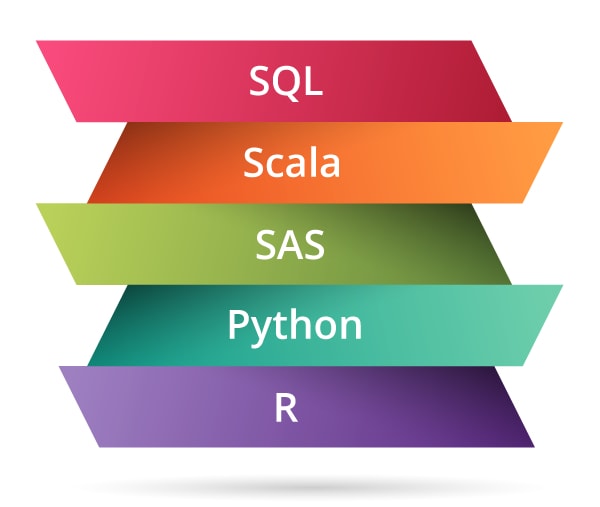
Apart from statistical and mathematical skills, you need to have some programming knowledge too. Hence, to become an expert in Data science field, you need to make the right decision on selecting the appropriate programming language. Below are the top 5 programming languages that you need to be aware of and get hands-on.
SQL:
A Data Scientist must have good knowledge of SQL, which is a database language to obtain data from systematized data origin known as Relational Databases. SQL is used for various purposes in Data Science like interrogating, deploying and updating queries. Retrieving data is an important part of Data Science and hence SQL plays a major role, as this is an extremely legible language with its declarative syntax. SQL has few implications like SQLite, MYSQL and PostgreSQL.
Scala:
Scala is a Java Programming Languages which operates on Java Virtual Machine. This programming language has the features of both a functional programming language and object-oriented language. Scala can be combined with Spark while using for programs. While dealing with larger volume data, Scala is the best for the Data Scientists.
SAS:
SAS is used for Statistical Analysis in Data Science, which is not an open-source programming language. SAS language is helpful for predictive modeling, progressive analytics, and business intelligence. There are many companies looking for protected and steady platforms that make use of SAS when there is a requirement for data analysis. A wide range of packages and libraries are provided by SAS for the purpose of Machine Learning and Statistical Analysis.
Python:
Python is a high-level programming language in Data Science, which is quite easy to use and also versatile. You can use a variety of libraries for numerous roles. As Data Science is known for its complexity, we need to use a simple language like Python for sure. Implementation becomes very simple if using Python for coding purposes by following the values of essential algorithms.
R:
If you need a perfect programming language for statistics related tasks, then you have to opt R for sure. To get a deep knowledge of data analytics and to become a master’s in data science, then just go ahead with the language R. Apart from data analysis and statistical programs, R cannot be used for any other general tasks.
The lifecycle of Data Science
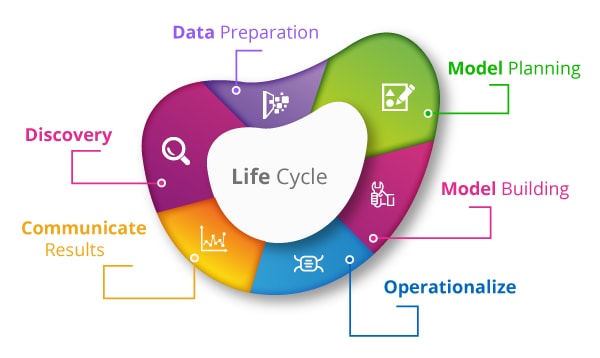
Let us explore the entire lifecycle of Data Science to get a better understanding.
Discovery:
This is the very beginning phase of the Data Science Lifecycle, in which you have to know the entire requirements, specifications, significances and essential budget. In this stage, you should be able to ask more and more questions on the project, need to check whether you have the relevant and the required resources, tools, technologies, time and data to complete the job. It is good to gather business issues and articulate the Initial Hypothesis for testing purposes.
Data Preparation:
You need to perform analytics in the second phase of the Data Science Lifecycle for the whole project and hence we have Analytic Sandbox in this phase. The process that we handle in this phase is exploring, pre-processing and conditioning the data just before modeling. Extract, Transform, Load and Transform (ETLT) is a process to be handled here to place data within a sandbox. Make use of the programming language R to clean, transform and visualize the data. On completing the data cleaning procedure, analytics must take place.
Model Planning:
In the Model Planning phase, you need to determine the systems and approaches to drawing the associations between variables. A base gets built up with this relationship for algorithms that will be executed in the next phase. Applying EDA (Exploratory Data Analytics) with the help of visualization tools and formulas happens in this phase. SQL, SAS, and R are the various tools used for Model Planning.
Model Building:
For testing and training reasons, you need to develop datasets in this Model Building phase. Analysis of numerous learning methods like association, classification, and clustering is made to construct the desired model. It is mandatory to check whether the tools selected will serve rightly to build the model or need to have more advancement in the process. Matlab, Statistica, WEKA, Alpine Miner are some of the tools used for Model Building.
Operationalize:
This is the phase where you will distribute final briefings, reports, technical documents, and code. If there is a need, we need to release a pilot project too in an actual production environment. Prior to full deployment, the entire would get a clear picture of project performance and related restrictions within a limited group.
Communicate Results:
The final phase is to Communicate Results, where we need to evaluate whether the goal planned in the initial phase is achieved or not. This is the time to communicate with shareholders, detect the key findings, analyze the result whether the project is success or failure based on conditions established in the first phase.
Companies using Data Science
It is mandatory for IT organizations to address their complex and expanding data environments in order to identify new value sources, exploit opportunities, and grow or optimize themselves, efficiently. Below are some of the best companies filled with Data Scientists.
Visa:
One of the most crucial online financial gateways is Visa. Millions of transactions are happening through Visa in a single day. For the processes like checking deceitful transactions, generating more profits, and to customize services and products as per the need of customers, the requirement of Data Scientist is becoming high for this organization.
Google:
We all know that Google is a very big company which is in high speed of hiring Data Scientist. Google is mostly driven by Machine Learning, Data Science, and Artificial Intelligence. Hence, candidates can get high pay from Google as the Data Scientists are playing a major role in Google to enhance various parts of the business.
Cloudera:
To transform complicated data into actionable insights, Cloudera is using Data Science in an effective method. This company used Machine Learning to automate any data analysis.
OpenText:
For the purpose of spotting patterns, analyzing data trends, and finding the relationship between various factors of data, OpenText is using Data Science technology. Interactive and visualization dashboards are aiding the users to understand the complete digital information.
Corterix:
Corterix is a company located in San Francisco, using the Data Science to design a central platform that pulls out the unstructured and structured data and place within a single structured query database. This helps the developers to write code easily.
Data Science Certification List
| S. No | Certification Name | Description |
| 1. | Certified Analytics Professional (CAP) | CAP certification helps to convert multifaceted data into valuable actions and insights. This is the exact action a business expects from a Data Scientist. On completing this course, you will be able to understand data, provide logical conclusions to the business and explain the significance of data to the stakeholders. The course cost would be approximately $500, and this certification is valid for 3 years. |
| 2. | Cloudera Certified Associate – Data Analyst | Cloudera Certified Associate enables you to handle the entire fundamental skills essential for a Data Scientist. On completing this exam, you can easily expose the knowledge as a Data Analyst and administrator. The cost of the exam per attempt is $295 and valid for 2 years. |
| 3. | Data Science Council of America – Senior Data Scientist | People who have more than 5 years of experience in analytics and research can opt for the DASCA (Data Science Council of America – Senior Data Scientist) certification course. You will be able to get knowledge of various segments like spreadsheets, quantitative methods, R, RDBMS, statistical analytics, etc. The cost of this exam would be approximately $650 and valid for 5 years. |
| 4. | Data Science Council of America – Principle Data Scientist | Data Science Council of America has four tracks for different levels of data science careers. QualiFly Route is the first track, track 2 for people working at DASCA partner organization, track 3 for candidates who have earned SDS certification, and track 4 for open applications. The cost varies for each track, where the approximate cost would be $850 and there is no expiration for this certification. |
| 5. | Google Certified Professional Data Engineer | People who have basic knowledge of Google’s cloud platform, managing solutions with GCP and designing experience can opt Google Certified Professional Data Engineer certification. Your abilities in building, designing, operationalizing and securing the machine learning models along with data processing methods are analyzed by this exam. The cost of the exam is approximately $200 and there is no expiration limit. |
| 6. | Google Data and Machine Learning | We have 3 tracks in this certification intended for data scientists, data analysts and data engineers. The cost of this exam would be approximately $200 and no expiration for credentials. |
Data Science in 2020
We can see a huge change, growth, and enhancement in business with the help of Data Science in the past few years to date. Now, we are entering 2020, there is a need to know what the upcoming trends in the Data Science field are.
Data Privacy and Security:
In the current technologies, security and privacy always seem to be a delicate topic. Though the companies are looking forward to moving quickly with various innovative ideas, they hesitate to expose a few concepts, and this could lead to losing their customer’s trust just because of privacy or security issues. Hence, Data Scientists are placing their priority on security and privacy to aid huge business to safely handle the customers and data as well.
Natural Language Processing:
Natural Language Processing having a firm place in Data Science. Data Science initially started as an examination of complete raw numbers as the people felt simple to handle data and gather within spreadsheets. In case of having any text for processing, you need to do some categorization and by anyway, convert those terms into numbers, which is a quite challenging task. Hence, NLP came into existence. The advanced NLP in 2020 is going to hit the sky and help for the success of the business.
Automated Data Science:
We can still see some manual work to be done in Data Science. Clearing up data, storing data, modeling data, exploring and visualizing data are some of the mentioned manual works handled in Data Science. These works are expected to be automated in 2020 as the entire team is working for a concept called ‘Automated Data Science’. Science and Machine Learning.
Read this Blog: Data Science Career Opportunities
Career, Roles, and Salary
Data Science experts are highly rewarded all over the world due to their strong technical skills. Numerous job opportunities with competitive salaries are existing and still expected to arise more in both small and big sized companies. More than 4000 positions are open for Data Science technology on Glassdoor. Data science specialists are required in most of the job sector and not specific to any single technology. Below are some of the important roles associated with Data Science along with the salary packages.
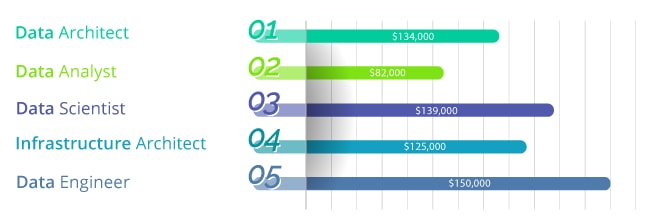
| S. No | Role | Description |
| 1. | Data Architect | Data Architects are responsible for tracking the application behavior that is used in a business, how each application is interacting with each other and the quality of user-friendliness. The annual salary would be approximately $134,000. |
| 2. | Data Scientist | Data Scientists are responsible for hunting, cleaning and organizing data within the companies. These people need to help in strategic business decisions with their huge analysis of complex raw data. The annual salary would be approximately $139,000. |
| 3. | Data Analyst | Data Analysts must transform and deploy huge data sets to make it suitable for company requirements. Analyzing A/B testing and web analytics tracking are additional tasks of the Data Analyst. The annual salary would be approximately $82,000. |
| 4. | Data Engineer | On the gathered and saved data, Data Engineers are expected to complete batch processing or actual processing. Data must be in a readable format for the Data Scientists. The annual salary would be approximately $150,000. |
| 5. | Infrastructure Architect | Infrastructure Architects are the ones who manage the entire business systems and they provide support for the fresh technologies development and system needs. The annual salary would be approximately $125,000. |
Importance for Data Science
The primary objective of data science is to extract meaningful information from a large and complex set of data. Below are some of the reasons for the need for data science.
- Traditionally, Business Intelligence (BI) was used to derive information from data and analysts did this. The data were mostly structured; however, over the past few years, most of the data accumulated is semi-structured or unstructured. It is estimated that by the end of the year 2020, most of the data generated will be unstructured data. Data is accumulated from various sources such as age and income of the consumer, browsing history, purchase history, and several other sources. Traditional Business Intelligence tools fail at deriving meaningful insights from such complex data sets. Therefore, advanced analytical tools and algorithms were the need of the hour. This paved the way for the emergence of data science.
- Attenuate fraud and risk. Data science with its advanced algorithms is designed to identify unusual patterns in data sets. They create models that help create notifications that send alerts when the system detects unusual data.
- Data science enables the precise recognition of demand and helps supply adjust to the requirements. This benefit of data science is changing the dynamics of production worldwide. It helps companies determine when and where to sell the products. It also makes predictions such as which time of the year the demand for a particular product might go up.
- Designing individual customer experience is one of the most beneficial things brought by data science. It allows the sales and marketing team of a company to understand the customers; design marketing strategies and customer experience that meets the individual needs of the target audience.
Data science helps answer tough business questions such as what is the number of customers that may go the competitor, future threat to the product, change in the preferences of customers, and more.
What is the Difference between Data Science and BI?
Business intelligence has a more hindsight approach to data. It looks at the past data from external and internal sources to assess the business trends. BI has the capability to predict events in the near future. Whereas data science has a forward-looking approach, it analyses the past and present data with the objective of facilitating decision-making. The following table presents the difference between data science and business intelligence.
| Features | Business Intelligence (BI) | Data Science |
| Source of Data | Structures data such as data warehouses and SQL | Structured and unstructured data such as SQL, logs, cloud data, text, NoSQL. |
| Approach | Statistics and visualization | Neuro-linguistic Programming (NLP), Machine Learning, Statistics, Graph analysis. |
| Tools | Present & Past | Present & Future |
| Focus | Microsoft BI, QlikView, R, Pentaho | Weka, RapidMiner, R, BigML |
Why Data Scientists are Valuable to Business?
A data scientist brings numerous benefits to a business. Below we have listed the top six reasons businesses need a data scientist.
- With the help of algorithms and advanced analytics, data scientists empower the management to make better decisions.
- Set a clear path for operation based on trends to improve the performance, productivity, and efficiency of the workforce.
- Help the staff in the organization to understand the analytical tools to derive insights and drive actions.
- Identify opportunities.
- Identifying the potential customer group
- Selecting the right talent for a job.
Conclusion
Data Science professionals are required in most of the field across the world. There are millions of government sections and businesses are purely relying on Big Data to flourish and be the best suit for the customers. Be sure that the Data Science trend will never slow down at any point in time and this profession exists forever. Data science is a new and innovative field of study. It holds great potential for businesses as well as other domains. Anyone pursuing data science as a career choice has tones of opportunities in the future. A successful data scientist is adept in R Programming, Hadoop, SAS, Spark, and similar software.

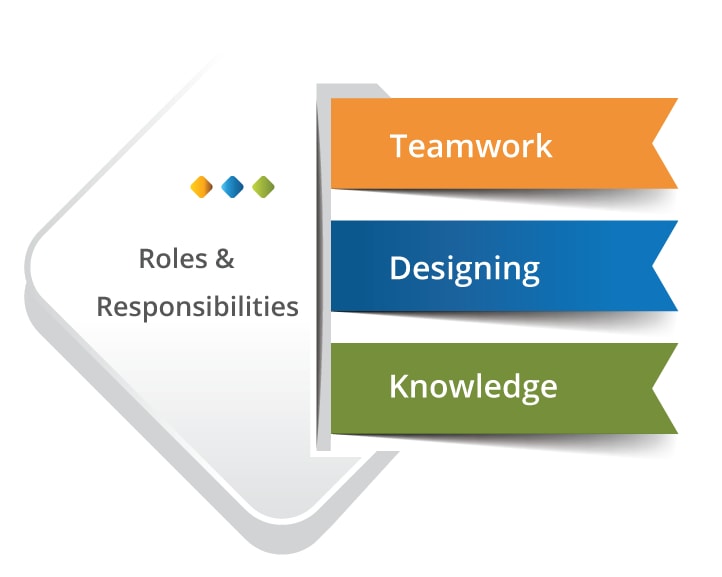
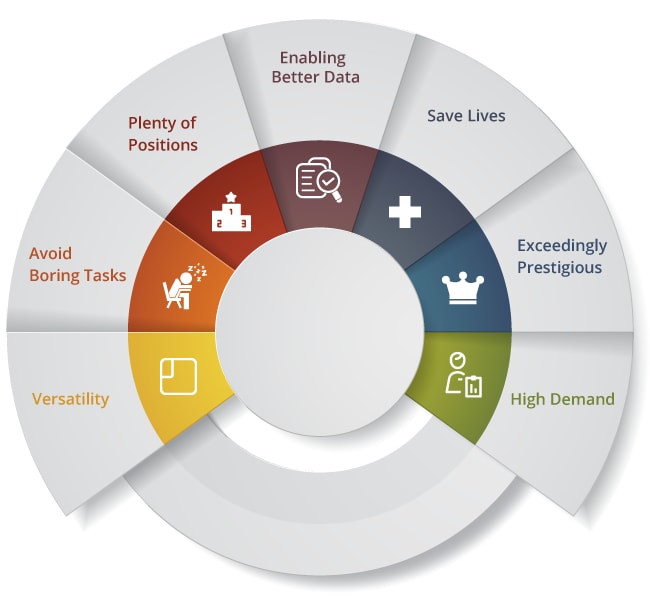
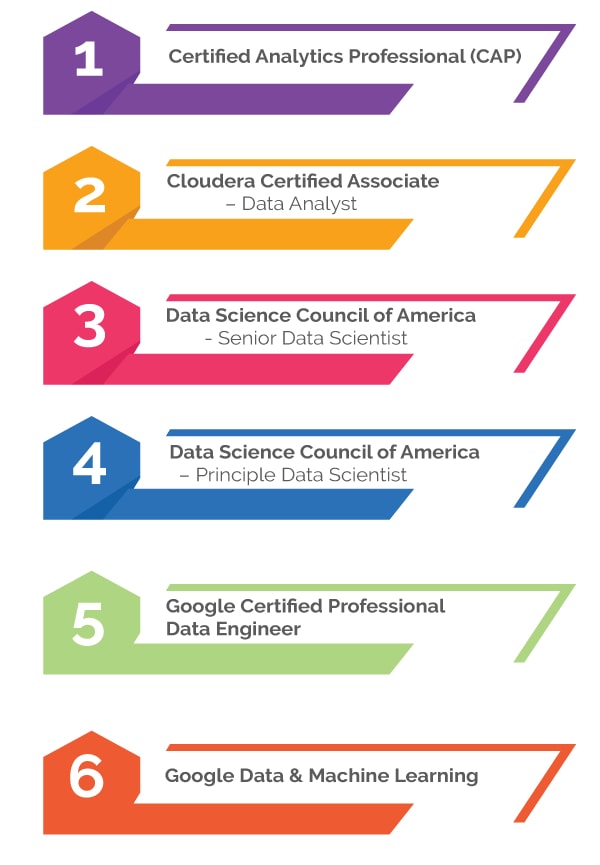

 +1 201-949-7520
+1 201-949-7520 +91-9707 240 250
+91-9707 240 250